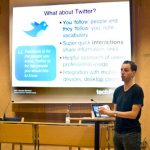You’ve probably used the major social media tools – Facebook, Twitter, Youtube, Flickr, LinkedIn, blogs. You’re probably using them more intensively personally than in work. But how can these tools be best used in a professional environment? Training courses I run can provide answers for you and your colleagues. If you’re wondering whether this is for you, have a look at some of my thoughts about social media for public administration, public diplomacy, NGO campaigns and party politics.
 I’m best known for his role in the Atheist Bus Campaign that famously raised £150000 online in order to display atheist slogans on buses across the UK. In party politics I’ve run online campaigns for Harriet Harman and Diane Abbott and more than two dozen MEPs and MPs from numerous European countries. My blog – www.jonworth.eu – is widely read and respected in EU politics. Plus I have been working in professional training since 2005. This is the experience I then draw upon to run training courses today.
I’m best known for his role in the Atheist Bus Campaign that famously raised £150000 online in order to display atheist slogans on buses across the UK. In party politics I’ve run online campaigns for Harriet Harman and Diane Abbott and more than two dozen MEPs and MPs from numerous European countries. My blog – www.jonworth.eu – is widely read and respected in EU politics. Plus I have been working in professional training since 2005. This is the experience I then draw upon to run training courses today.
More recently I have started running academic workshops about online communications in politics – I am a visiting lecturer at the College of Europe (Bruges), the University of Maastricht, the University of St Gallen, and Quadriga (Berlin).
The ideal approach is to design a bespoke training course to match your organisation’s needs – please do contact me about this. A list of suggested training modules is provided below.
Clients
Current and repeat clients
Clear Europe, Brussels, Belgium (More information)
College of Europe, Bruges, Belgium (More information)
The ECPA, Brussels, Belgium
Italian School of Public Administration (SNA), Caserta, Italy (More information)
Quadriga Hochschule, Berlin, Germany (More information)
University of Maastricht, Netherlands
University of St Gallen, Switzerland
Recent one-off work
Aarhus School of Journalism (DJØF), Aarhus, Denmark
Böll Stiftung, Berlin, Germany
Cefic, Brussels
DG DEVCO, DG REGIO, DG TAXUD, European Commission, Brussels, Belgium
Diplomatenkolleg Berlin, Germany
EIPA, Maastricht, Netherlands
EU Ombudsman, Brussels, Belgium
European Economic and Social Committee, Brussels, Belgium
EuroDad, Brussels, Belgium
European Food Safety Authority, Parma, Italy
German Embassy to Vietnam, Hanoi, Vietnam
Helsinki EU Office, Brussels, Belgium
Humanistische Akademie Berlin-Brandenburg, Germany
Jan Philipp Albrecht MdEP, Germany
MitOst, Berlin, Germany
MM4P UNDP, Brussels, Belgium
Oxfam, Brussels, Belgium
Svensk Näringsliv EU, Brussels, Belgium
Union of European Federalists, Brussels, Belgium
URBACT Network, Paris, France
YPFP, Brussels, Belgium
ZN Consulting, Brussels, Belgium
Note: some of this one-off work was sub-contracted to me
Older work
ANTERO Network, EU-wide
APCO Worldwide, Brussels, Belgium
BEUC, Brussels, Belgium
Blavatnik School of Government, Oxford, UK
Böll Stiftung, Zagreb, Croatia
Brewers of Europe, Brussels, Belgium
CIDOB, Barcelona, Catalonia
Confederation of European Paper Industries, Brussels, Belgium
COPA COGECA, Brussels, Belgium
Deutsche Bauernverband, Berlin, Germany
DG CNECT, European Commission, Brussels, Belgium
DG COMM, European Commission, Brussels, Belgium
DG JUST, European Commission, Brussels, Belgium
Diplocat, Barcelona, Catalonia
Embassy of the Netherlands, London, UK
EU Special Representative’s Office, Sarajevo, Bosnia & Herzegovina
Eurogroup for Animals, Brussels, Belgium
European Alternatives, Berlin, Germany
European Commission Representation, Bucharest, Romania
European Fund for the Balkans, Berlin, Germany
European Movement International, Brussels, Belgium
European Policy Centre, Brussels, Belgium
European Public Health Alliance, Brussels, Belgium
European Venture Capital Association, Brussels, Belgium
European Youth Forum, Brussels, Belgium
Eurotopics, Berlin, Germany
Forbrukerrådet, Oslo, Norway
Green European Foundation, Brussels, Belgium
Greenpeace EU, Brussels, Belgium
Greens-EFA Group in the European Parliament, Brussels, Belgium
GUE NGL Group in the European Parliament, Brussels, Belgium
HEC, Paris, France
IABC, Brussels, Belgium
Interreg North Sea Region, Viborg, Denmark
Law Society, London, UK
London School of Economics, London, UK
Med Tech Europe, Brussels, Belgium
Netroots-Nätröt, Stockholm, Sweden
Netzwerk Europäische Bewegung Deutschland, Berlin, Germany
Personal Democracy Forum Europe, Barcelona, Catalonia
Pinnacle PR Training, London, UK
Public Affairs Council, Brussels, Belgium
Re-publica, Berlin, Germany
S&D Group in the European Parliament, Brussels, Belgium
State of the Net Conference, Trieste, Italy
Stattnett EU Office, Brussels, Belgium
TIE Europe, Brussels, Belgium
University of Roskilde, Denmark
WHO Europe, Copenhagen, Denmark
Wind Europe, Brussels, Belgium
Note: some of this one-off work was sub-contracted to me
Training Modules
1. Social media and new communication patterns
– Introduction to the most important social media tools
– Engagement pyramid – how particular tools are relevant to different groups
– How to engage people to participate in social media
2. Strategies for Twitter, Facebook, LinkedIn and other social networks
– The difference between the platforms
– Relevant case studies
– The power of Google: getting your social media content highly ranked in search engines
3. Online writing and blogging
– ABC for web writing
– How to write for web vs. print
– Developing a blogging strategy
4. Monitoring, RSS and online reputation management
– How to use RSS efficiently
– The monitoring tools that exist and how they function
– How to deal with and respond to critique online
Does your organisation need online communication training?
 Online communication… for public administration
Online communication… for public administration
Should the public sector even be using these tools? Within a sensitive, public sector communications environment, how can social media be integrated with the regular communications functions? What social media tools work well and which are best avoided? What staff policy is needed to embrace social media effectively? How do you keep an eye on what people are writing about you online?
 Online communication… for public diplomacy
Online communication… for public diplomacy
Can an embassy effectively blog, tweet or use Facebook? What role should political staff play in this process, and what should be left to communications teams? How can influential bloggers be identified and brought into online discussion? Which combination of languages work best for public diplomacy purposes online? How should a social media policy for staff be drafted?
 Online communication… for NGO campaigns
Online communication… for NGO campaigns
How are reputations forged (and destroyed) online? What is the return on investment for social media campaigns? Is there a way to move beyond the email-to-action model? What blogs are important to NGOs? Can Facebook be used to drive donations to charities? How can ‘clicktivism’ be transformed into genuine offline activity? What are the new trends in social media, and how can these be best exploited?
 Online communication… for party political campaigns
Online communication… for party political campaigns
Should a candidate blog, tweet or use Facebook? If so, how, and what are the common pitfalls? How can workflow be streamlined to ensure a candidate’s precious time is not wasted? How can open source software be used to reduce costs? Is blogging worthwhile, and should it be done on a candidate’s own site, or elsewhere? What is the best way to reply to online critique?







